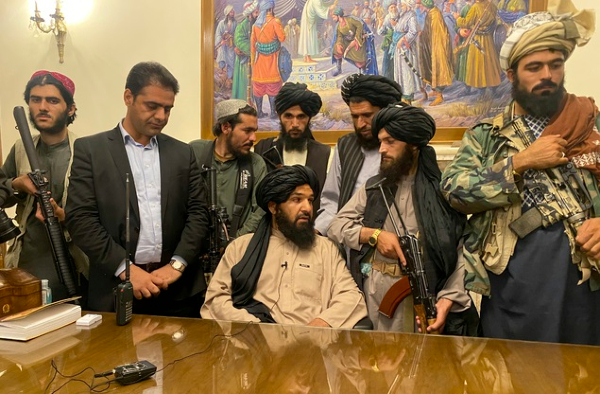With five days left before the complete US withdrawal from Afghanistan, the worst possible outcome occurred in Kabul, the capital city. On August 26, suicide bombers near the Kabul International Airport killed 12 US soldiers and dozens of civilians. Shortly after the blast took place, the Islamic State in Iraq and Syria (ISIS) based in Afghanistan took responsibility for the attack. The Taliban immediately issued a statement criticizing their actions as terrorism, calling it anti-humanitarian. ISIS is an extremist group that claims Islamic fundamentalism like the Taliban, but differences in their goals and methods forced the parties to split 2014. From the perspective of non-Muslims however, they are no different because they have the same religion and community values. The Taliban disagrees. So why did ISIS commit this suicide bombing attack? Experts say that this was a chain reaction from the withdrawal of US troops from Afghanistan. The Taliban's rule over Afghanistan was formalized by the withdrawal of US troops. It also left the nation with no choice but to deal with other Islamic extremist terrorist groups operating in its territory. Particularly problematic for the Taliban are Al-Qaeda and ISIS.
 |
| ▲ ISIS's brutal murder of civilians. (Photo from KBS) |
When President Biden announced his intention to complete the withdrawal from Afghanistan he said, “Our goal was to eliminate the terrorists responsible for the 9.11 attack and Al-Qaeda has been destroyed.” In addition, the Taliban has pledged to stop Al-Qaeda from attacking the United States and its allies since 2001. But members of the terror group remain in Afghanistan and welcome the Taliban’s occupation. When the Taliban first ruled Afghanistan from 1996 to 2001, they provided shelter for Al-Qaeda armed forces and their leader, Osama bin Laden, the mastermind behind the September 11 attack on the US. AS a result, the United States had stationed troops in Afghanistan for 20 years to suppress Al-Qaeda. At the time, Al-Qaeda was considered the same as the Taliban from the perspective of the United States. That was then, but what about now? Pawaz Gerges, a professor at London's School of Economics, said only a shadow of the original Al-Qaeda remain. It has mostly collapsed after 20 years of counter-terrorism operations. However, according to a recent United Nations (UN) report, Al-Qaeda is stationed in 15 Afghan states and is estimated to have dozens to 500 members. Taliban spokesman Muhammad Naim denied this report in an interview with Saudi Al-Hadas TV on August 23. He said there could be "family ties" between Al-Qaeda and the Taliban because Osama bin Laden and the head of the Taliban were in-laws, but there is no formal relationship between them now. However, the UN still believe their relationship exists because the homogeneity of the two groups were never disturbed through marriage connections and the identity of religious values. It is unlikely that the Taliban will immediately reveal its relationship with Al-Qaeda. However, thanks to the maintenance of the bond between the two groups, for one reason or another, Al-Qaeda tends to work under the Taliban's control. The main problem for the two of them is ISIS.
Experts say the Taliban is likely to root out ISIS-K. But some warned that while the Taliban works on consolidating its power, ISIS-K could end up benefitting from the security vacuum that results from the withdrawal of the US military. The Biden Administration had previously warned the public that they pose the single most important threat to the safe evacuation of allies from Afghanistan. ISIS, is the bane of the Taliban in Afghanistan. According to a report from the Center for Strategic and International Studies (CSIS), ISIS formed the Islamic State-Khorasan Province (ISIS-K) in Afghanistan in 2015. It is a small organization that was splintered out of the Taliban and was set up in January 2015. It consists of both Pakistani and Afghan jihadists. The group was able to round up former members of the Afghan Taliban who do not see their own organization as extreme enough. What makes them different from the Taliban is that ISIS-K aims to make a nation that is built around a religious ideology that runs through all Islamic societies. However, the Taliban aims to make a unified nation out of Afghanistan only, with its accompanying Sharia laws. ISIS-K has never successfully occupied Afghanistan’s territory so far, but within its first three years, they launched brutal attacks against civilians, minority groups, public areas and institutions, and government targets in major cities across the country and in Pakistan.
So how did Afghanistan become so politically complex? There are two reasons for this. First, there is a lot of corruption in Afghanistan. In 2020, Transparency International’s Corruption Perception Index ranked Afghanistan in 165th place out of 180 countries. Large amounts of money for public infrastructure such as schools has disappeared due to corruption. The systematic failure to contain the problem has continued to undermine the development of the country. The second reason is interference by the American military-industrial complex in the functioning of the country. They earned huge amounts of money during the Afghanistan War. Along the way, Afghanistan was a weapons test site causing countless amounts of damage in property and lives across the country. A Hankyoreh article from Hankuk University of Foreign Studies Professor Yoo Dal-seung revealed that “the reaction of many Afghans towards both the Taliban and the US were both negative.” This is why the 20-year war in Afghanistan ended up as a defeat for democracy causing lasting political unrest.
 |
| ▲ The Taliban who took over Afghanistan's presidental palace. (Photo from Monthlychosun) |
At this point, with the Taliban in charge of the country, people are left speculating whether they will change their ways and adopt instead an open and democratic society. On August 17, Taliban spokesperson Zabiullah Mujahid assured the world that they will respect women’s rights within the Islamic law, forgive those who had opposed them, and ensure a secure Afghanistan. This is a different platform from the one being espoused at the start of the Taliban’s previous government in 1996. In the past, they enforced strict Islamic rules and carried out brutal punishments like stonings. They also confined women to their homes and prohibited them from participating in society. As of now, there has been no official declaration of their intention to ban women’s activities. What is also different is that the Taliban is working with various political parties to create a legitimate government. They recently held a Loya Jirga, or grand council, to discuss the future of Afghanistan.
It is possible that the current Taliban will completely change their ruling style. Their relationship with both the US and China has evolved in recent years. The relationship between the US and the Taliban may be restored due to their shared interests of containing a common enemy such as ISIS-K. In a press conference on September 1, the Chairman of the Joint Chiefs of Staff, Mark Milley said, “It’s possible” that the US military may work with the Taliban against ISIS-K. However, some fear if the Taliban are seen to be meekly following the United States, more of their own members who prefer a more radical ideology, might be persuaded to join ISIS-K. The US is not the only relationship being groomed. The link between China and the Taliban is more complicated than ever due to the Turkistan Islamic Movement (TIM) in Xinjiang. The Chinese government is willing to hold hands with the Taliban in hopes of more thorough control of the movement within its own borders. Therefore, many predict that China will economically support the Taliban to suppress the operations of the TIM in their region.
The Taliban may not look on idly on ISIS-K’s attack. Michael Kugelman predicted that they could use newly acquired US made weapons to attack them as they urgently want to show the Western world that they have parted ways with the Taliban of the past. The withdrawal of the US military from Afghanistan received antithetical press. Some pundits say it was a failure in the goals and tactics of building a liberal democratic nation, while others say that it was a strategy in international politics to improve Afghanistan, but also to annihilate opposition like ISIS-K. This would mean the purpose of the withdrawal of the US military was to trigger a liberal led international order. Whatever happens, the world will be watching.
류시은, 권유지, 김서연, 김혜선 dankookherald@gmail.com

![[Campus Magnifier] Let's Surf the Library!](/news/photo/202404/12496_1765_4143.jpg) [Campus Magnifier] Let's Surf the Library!
[Campus Magnifier] Let's Surf the Library!
![[Campus Magnifier] Let's Surf the Library!](/news/thumbnail/202404/12496_1765_4143_v150.jpg)





